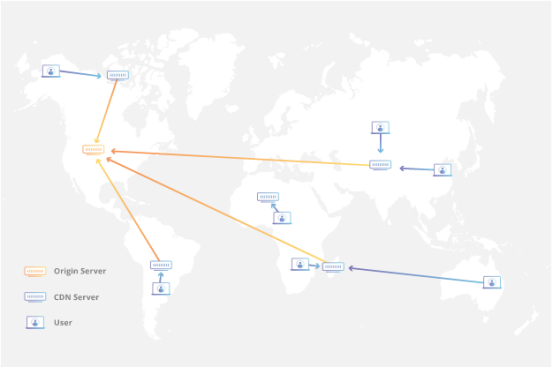It is important to note that the benefits of using a CDN vary depending on the size and needs of an Internet property, but the primary benefits for most people are the following:
Website visitors experience faster page load times when content is distributed closer to them using CDN servers (among other optimizations). By reducing bounce rates and increasing the time visitors spend on a slow-loading site, a CDN can avoid visitors clicking away. Faster websites will attract more visitors and keep them around for a longer period of time.
- The primary expense for website hosting is bandwidth consumption. As a result of caching and other optimizations, CDNs can reduce the amount of data origin servers must provide, thereby reducing hosting costs.
- In the event of a large amount of traffic or hardware failure, the normal functioning of a website may be disrupted. Since CDNs are distributed, they can handle more traffic and withstand hardware failures better than many origin servers.
- CDNs can improve website security by mitigating DDoS attacks, enhancing security certificates, and optimizing other aspects.
What Is a CDN?
The goal of a CDN is to deliver content as quickly, cheaply, reliably, and securely as possible. CDNs place servers at network exchange points to improve speed and connectivity.
The Internet exchange points (IXPs) are the primary locations where different Internet providers connect to exchange traffic between each other. Having a connection to these high-speed and highly interconnected locations allows a CDN provider to reduce costs and transit times for high-speed data delivery.

CDNs do more than place servers in IXPs. They optimize the client-server data transfer process in a number of ways. Various types of failures and Internet congestion are handled by CDNs by placing Data Centers across the globe.
How Does a CDN Reduce Website Latency?
Slow loading websites cause users to abandon a site quickly. The following ways can help reduce load times with CDN services:
CDNs reduce distance between users and website resources because they are globally distributed. The CDN lets users connect to a data center that is closer to their location instead of connecting to the origin server. The faster the service, the less time it takes to travel.
- Data can be delivered to users faster with hardware and software optimizations such as efficient load balancing and solid-state drives.
- By reducing file sizes using tactics such as minification and compression, CDNs can reduce data transfer. Load times are faster when files are smaller.
- Additionally, CDNs can speed up sites using TLS/SSL certificates by optimizing connection reuse and enabling TLS false start.
A CDN's reliability and redundancy - How does it keep a website online at all times?
Having an Internet property requires a high level of uptime. An unexpected spike in traffic or hardware failure, whether malicious or unintentional, can cause a site or service to go down and prevent users from accessing it. To minimize downtime, a CDN should have the following features:
- As network traffic is distributed evenly across several servers, load balancing enables rapid traffic increases to be handled easily.
- When a CDN server goes offline due to a hardware malfunction, intelligent failover provides uninterrupted service. Traffic can then be redistributed to the remaining servers.
- Anycast routing ensures that users cannot lose access to the website if an entire data center is down.
CDN Data Security - How does it protect data?
A CDN's security is integral. Keeping a site secure with fresh TLS/SSL certificates will ensure high standards of authentication, encryption, and integrity for the site. Explore how CDNs can deliver content securely, and investigate the security concerns surrounding them. Secure CDNs with SSL/TLS
Expenses related to bandwidth - How does a CDN reduce them?
An origin server consumes bandwidth every time it responds to a request. Learn how a CDN, like Cloudflare, reduces bandwidth costs and origin requests.
